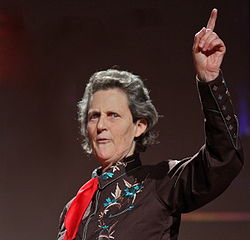Emmy’s Big Question: Who is Temple Grandin?

One of the big winner at last night’s Emmy Awards was an HBO film called Temple Grandin. It won Emmys for Outstanding Made For Television Movie, Outstanding Supporting Actor in a Miniseries or a Movie – David Strathairn, Outstanding Lead Actress in a Miniseries or a Movie – Claire Danes, Outstanding Directing for a Miniseries – Mick Jackson, and Outstanding Supporting Actress in a Miniseries or a Movie – Julia Ormond. The movie is a biopic of Dr. Temple Grandin, a woman with autism who has become one of the top scientists in the humane livestock handling industry. Born in 1947, Grandin was diagnosed early in life with “brain damage” (the term autism hadn’t been termed yet)- she was unable to speak until she was 4 years old; she was socially withdrawn and had frequent tantrums. Typically, a child with these symptoms at that point in history would be institutionalized, however Temple’s mother refused to allow this to happen. Instead she gave her speech therapy, put her in a structured nursery school and hired a nanny who spent hours playing with her. With the support of her mother, her aunt and a number of teachers at school, Temple eventually went on to get a doctorate in Animal Science from Arizona State University and became a professor at Colorado State University. She was the subject of an Oliver Sachs book- An Anthropologist on Mars, and wrote a number of books telling her own story about being autistic including :The Way I See It: A Personal Look at Autism and Asperger’s, and Thinking in Pictures. Grandin has been an advocate promoting humane livestock handling processes. Her Livestock Web site has entire sections on how to improve standards in slaughter plants and livestock farms. She has also been an renowned public advocate for those born on the autistic spectrum. She has been the subject of a number of documentaries about her life. Links to excerpts of these can be found here:
The Woman who Thinks Like a Cow.
Stairway to Heaven — Temple Grandin Part 1
Asperger’s Syndrome (AS) is a developmental disorder which is part of the Autistic Spectrum Disorders (ASD)- a group of neurological conditions characterized by a greater or lesser degree of impairment in communication and social skills, as well as repetitive or restrictive patterns of thought and behavior. Individuals with AS are differentiated from others with autism in that they retain their early language and cognitive skills, and tend to be less severely impaired than those with autism.
Like those with autism, those with AS tend to be socially awkward, have difficulty with changes in routine, have clumsy and uncoordinated motor movements, and engage in repetitive routines or rituals. The most distinguishing symptom of AS is an individual’s obsessive interest in a single object or topic to the exclusion of any other. They frequently have such expertise in this topic, and speak with such formal speech patterns, that they seem like little professors. Children with AS are isolated because of their poor social skills and narrow interests.
The cause of autism and Asperger’s Syndrome are unknown. There is no known “cure,” however much can be done to help these individuals. The ideal treatment for AS coordinates therapies that address the three core symptoms of the disorder: poor communication skills, obsessive or repetitive routines,and physical clumsiness. There is no single best treatment package for all children with AS, but most professionals agree that the earlier the intervention, the better.
























0 comments